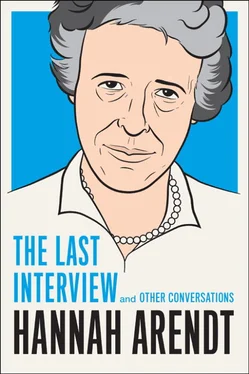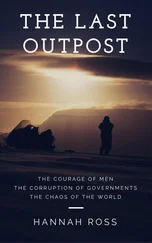GAUS:I was just about to ask you if you still believe that.
ARENDT:No longer to the same degree. But I still think that it belongs to the essence of being an intellectual that one fabricates ideas about everything. No one ever blamed someone if he “coordinated” because he had to take care of his wife or child. The worst thing was that some people really believed in Nazism! For a short time, many for a very short time. But that means that they made up ideas about Hitler, in part terrifically interesting things! Completely fantastic and interesting and complicated things! Things far above the ordinary level! I found that grotesque. Today I would say that they were trapped by their own ideas. That is what happened. But then, at that time, I didn’t see it so clearly.
GAUS:And that was the reason that it was particularly important for you to get out of intellectual circles and start to do work of a practical nature?
ARENDT:Yes. The positive side is the following. I realized what I then expressed time and again in the sentence: If one is attacked as a Jew, one must defend oneself as a Jew. Not as a German, not as a world citizen, not as an upholder of the Rights of Man, or whatever. But: What can I specifically do as a Jew? Second, it was now my clear intention to work with an organization. For the first time. To work with the Zionists. They were the only ones who were ready. It would have been pointless to join those who had assimilated. Besides, I never really had anything to do with them. Even before this time I had concerned myself with the Jewish question. The book on Rahel Varnhagen was finished when I left Germany. [a] Except for the last two chapters, which were written sometime between 1933 and 1936 in France. Rahel Varnhagen: The Life of a Jewish Woman , rev. ed. (New York: Harcourt Brace Jovanovich, 1974), xiii.
The problem of the Jews plays a role in it. I wrote it with the idea, “I want to understand.” I wasn’t discussing my personal problems as a Jew. But now, belonging to Judaism had become my own problem, and my own problem was political. Purely political! I wanted to go into practical work, exclusively and only Jewish work. With this in mind I then looked for work in France.
GAUS:Until 1940.
ARENDT:Yes.
GAUS:Then during the Second World War you went to the United States of America, where you are now a professor of political theory, not philosophy…
ARENDT:Thank you.
GAUS:… in Chicago. You live in New York. Your husband, whom you married in 1940, is also a professor, of philosophy, in America. The academic community, of which you are again a member—after the disillusionment of 1933—is international. Yet I should like to ask you whether you miss the Europe of the pre-Hitler period, which will never exist again. When you come to Europe, what, in your impression, remains and what is irretrievably lost?
ARENDT:The Europe of the pre-Hitler period? I do not long for that, I can tell you. What remains? The language remains.
GAUS:And that means a great deal to you?
ARENDT:A great deal. I have always consciously refused to lose my mother tongue. I have always maintained a certain distance from French, which I then spoke very well, as well as from English, which I write today.
GAUS:I wanted to ask you that. You write in English now?
ARENDT:I write in English, but I have never lost a feeling of distance from it. There is a tremendous difference between your mother tongue and another language. For myself I can put it extremely simply: In German I know a rather large part of German poetry by heart; the poems are always somehow in the back of my mind. I can never do that again. I do things in German that I would not permit myself to do in English. That is, sometimes I do them in English too, because I have become bold, but in general I have maintained a certain distance. The German language is the essential thing that has remained and that I have always consciously preserved.
GAUS:Even in the most bitter time?
ARENDT:Always. I thought to myself, What is one to do? It wasn’t the German language that went crazy. And, second, there is no substitution for the mother tongue. People can forget their mother tongue. That’s true—I have seen it. There are people who speak the new language better than I do. I still speak with a very heavy accent, and I often speak unidiomatically. They can all do these things correctly. But they do them in a language in which one cliché chases another because the productivity that one has in one’s own language is cut off when one forgets that language.
GAUS:The cases in which the mother tongue was forgotten: Is it your impression that this was the result of repression?
ARENDT:Yes, very frequently. I have seen it in people as a result of shock. You know, what was decisive was not the year 1933, at least not for me. What was decisive was the day we learned about Auschwitz.
GAUS:When was that?
ARENDT:That was in 1943. And at first we didn’t believe it—although my husband and I always said that we expected anything from that bunch. But we didn’t believe this because militarily it was unnecessary and uncalled for. My husband is a former military historian, he understands something about these matters. He said don’t be gullible, don’t take these stories at face value. They can’t go that far! And then a half year later we believed it after all, because we had the proof. That was the real shock. Before that we said: Well, one has enemies. That is entirely natural. Why shouldn’t a people have enemies? But this was different. It was really as if an abyss had opened. Because we had the idea that amends could somehow be made for everything else, as amends can be made for just about everything at some point in politics. But not for this. This ought not to have happened. And I don’t mean just the number of victims. I mean the method, the fabrication of corpses and so on—I don’t need to go into that. This should not have happened. Something happened there to which we cannot reconcile ourselves. None of us ever can. About everything else that happened I have to say that it was sometimes rather difficult: we were very poor, we were hunted down, we had to flee, by hook or by crook we somehow had to get through, and whatever. That’s how it was. But we were young. I even had a little fun with it—I can’t deny it. But not this. This was something completely different. Personally I could accept everything else.
GAUS:I should like to hear from you, Miss Arendt, how your opinions about postwar Germany, which you have often visited, and in which your most important works have been published, have changed since 1945.
ARENDT:I returned to Germany for the first time in 1949, in the service of a Jewish organization for the recovery of Jewish cultural treasures, mostly books. I came with very good will. My thoughts after 1945 were as follows: Whatever happened in 1933 is really unimportant in light of what happened after that. Certainly, the disloyalty of friends, to put it bluntly for once…
GAUS:… which you experienced personally…
ARENDT:Of course. But if someone really became a Nazi and wrote articles about it, he did not have to be loyal to me personally. I did not speak to him again anyhow. He didn’t have to get in touch with me anymore, because as far as I was concerned he had ceased to exist. That much is clear. But they were not all murderers. There were people who fell into their own trap, as I would say today. Nor did they desire what came later. Thus it seemed to me that there should be a basis for communication precisely in the abyss of Auschwitz. And that was true in many personal relations. I argued with people; I am not particularly agreeable, nor am I very polite; I say what I think. But somehow things were set straight again with a lot of people. As I said, all these were only people who were committed to Nazism for a few months, at the worst for a few years; neither murderers nor informers. People, as I said, who “made up ideas” about Hitler. But the general, and the greatest experience when one returns to Germany—apart from the experience of recognition, which is always the crux of the action in Greek tragedy—is one of violent emotion. And then there was the experience of hearing German spoken in the streets. For me that was an indescribable joy.
Читать дальше












